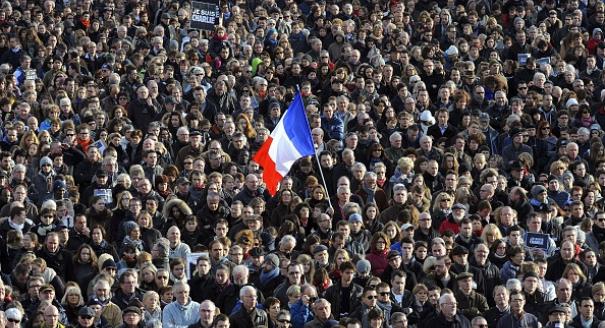It took the killing of seventeen French citizens, including four of the country’s leading cartoonists, by Islamist terrorists on January 7–9 to bring millions of people out onto the streets across France on January 11. They were supported by many peaceful demonstrations in other European cities. All the protesters had one aim in common: to defend freedom and tolerance.
This show of solidarity with the victims of Charlie Hebdo, a satirical magazine that publishes irreverent cartoons of Christians and Jews as well as Muslims, may reveal how Europeans are finally emerging from their comfort zone. Inside that comfort zone, it was assumed that Europe’s democracy and stability were not threatened—that both were a given. The recent attacks in Paris and the public reaction to the killings have, for the moment, punctured that perception.
The threats from Islamists and from Russia take different forms. The former is based on violence. Andrew Parker, chief of Britain’s Security Service (MI5), issued a grim warning to that effect on January 8. “A group of core al Qaeda terrorists in Syria is planning mass casualty attacks against the West,” he said. Parker added that al-Qaeda militants in Syria aimed to “cause large-scale loss of life, often by attacking transport systems or iconic targets” in the West.
After the Charlie Hebdo killings, European leaders proposed to work much more closely together by sharing intelligence and cooperating over security.
Europe also faces a threat from Russia, but in different way. Apart from attempts to destabilize Ukraine, the most insidious Russian menace is the Kremlin’s efforts to influence far-right, populist, and Euroskeptic movements across Europe, through either direct or indirect funding. Marine Le Pen, the leader of France’s National Front, admitted the party had received such backing from Moscow.
To counter threats to European stability, unity is more necessary than ever.Tweet This
These movements and political parties oppose the opening of Europe’s doors to immigrants or refugees and are particularly critical of Muslims. They also question certain liberal social values by opting for a conservatism that reflects the outlook articulated by supporters of Russian President Vladimir Putin. Above all, they oppose a strong, united, and integrated Europe.
The temptation for European governments is to pander to these movements by co-opting some of their ideas, instead of explaining to the electorate about the contributions made by immigrants.
Take the example of the hundreds of thousands of Poles who moved to Britain over the past decade. Despite being pilloried for taking British jobs by the UK Independence Party (UKIP), which wants to pull Britain out of the EU, Poles and immigrants in general have contributed to the British economy, repeated studies have shown.
In Germany, which has recently adopted a much more open policy toward immigrants and refugees, Chancellor Angela Merkel has spoken out unequivocally against Pegida, a group that campaigns against what it describes as the Islamization of the West.
Russia’s support for these Euroskeptic movements is designed to weaken the EU. As it is, Moscow increasingly sees the EU and its continuing attraction to many countries in Eastern Europe as a threat to Russia’s interests.
The determination by Ukraine’s government to introduce radical economic and political reforms to move closer to the EU greatly worries Putin. After all, a democratic and economically successful Ukraine would challenge the political and economic system that Putin has built over the past dozen years.
A weak and disintegrating EU could become less attractive for Eastern Europe.Tweet This
And the ability of the 28 EU member states—so far—to keep together over introducing and maintaining sanctions on Russia in response to its invasion of Crimea and parts of eastern Ukraine surprised Putin. So much the better it would be for Russia if the EU were weak and distracted, torn by divisions between Euroskeptics and those who want a more integrated and united EU.
A weak and disintegrating EU could become far less attractive for Eastern Europe. It would also pose far less of a threat to Russia. And a weaker Europe less committed to its values is in the interests of Islamists. This is not the time for Europe to retreat into its comfort zone.










